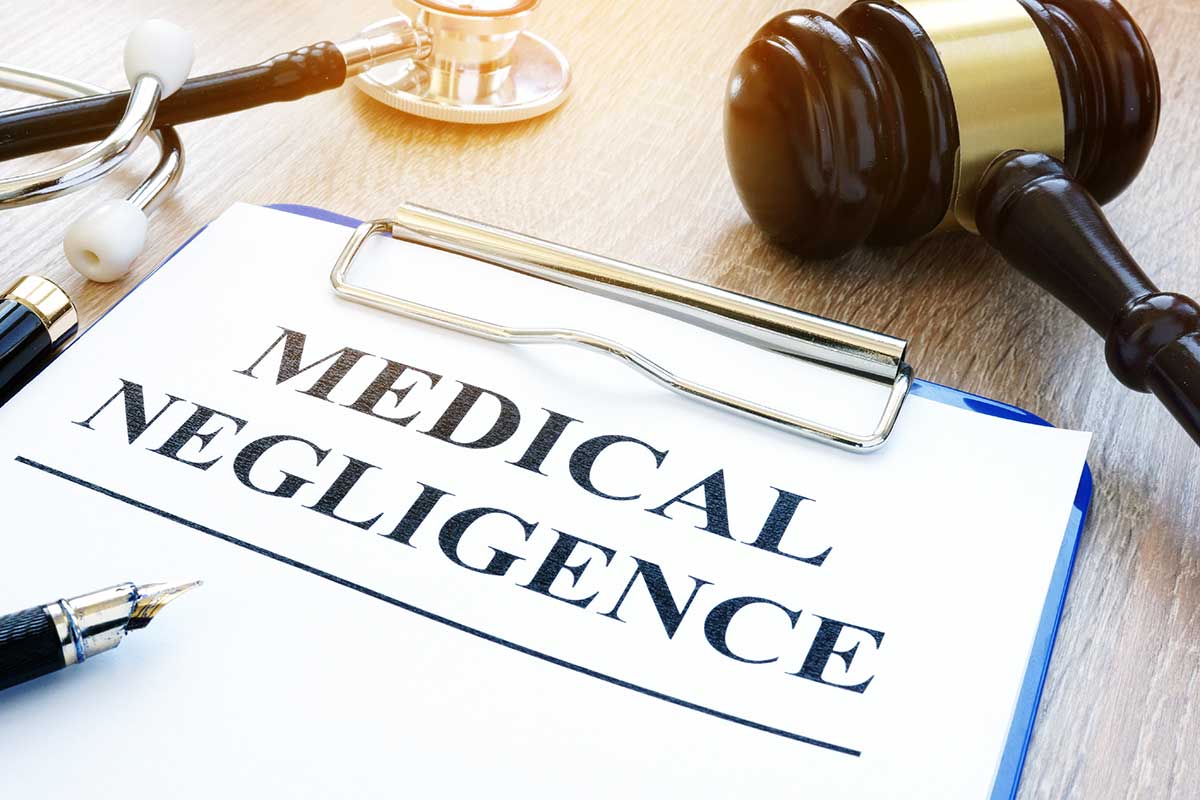While millions of people in this country receive first class medical care each year, unfortunately there is always a small percentage of people who suffer because of a medical accident. Mistakes are to be expected in all industries and walks of life, but unfortunately in medical practice the stakes are so high that improper health care can often come at great physical, emotional and financial cost to the victim.
If you have suffered from medical negligence of any kind, you may be entitled to compensation. We are able to offer a full medical negligence service under a No Win, No Fee agreement, meaning that you’ll be able to pursue a compensation claim with the help of one of our expert medical negligence lawyers without the financial risk of paying legal fees up front.

Table of Contents
What is Medical Negligence
Health professionals have a duty of care for their patients, which requires them to provide the best possible clinical service that they can. If they fall below this standard, and deliver inadequate treatment that leads to injury, pain, trauma or the worsening of an existing condition, this can be described as medical negligence.
Medical negligence can occur at any point of the medical journey, whether it’s a GP visit, surgery or aftercare. Substandard care can be delivered by a medical practitioner in the form of a misdiagnosis, an incorrect treatment plan, a surgical mistake and many other unfortunate circumstances which we’ll discuss in the next section.
What are some common Medical Negligence Claims
The purpose of a medical negligence claim is to obtain compensation for the injured or affected person or family members for any loss, pain or suffering that they have experienced as a result of medical malpractice. When poor health care could have been avoided, the medical body at fault should be held to account, to recompense the victim and make sure the same mistake doesn’t happen again.
According to NHS Resolution, the NHS received 15,078 claims of medical negligence in 2021/2022. That works out at over 40 claims per day! As you might imagine from these statistics, medical negligence claims can stem from many reasons, but common examples include failure to properly diagnose a condition, premature discharge of a patient, prescription mistakes, and surgical errors.

Hospital Negligence Claims
If you or a loved one have experienced harm or injury as a patient during a visit to the hospital, in a situation where a healthcare provider failed to meet the accepted standards of medical care, you may be eligible to claim hospital negligence compensation.
Medical negligence in hospitals can take many forms, including:
- Misdiagnosis: A misdiagnosis resulting in harm to a patient due to a healthcare provider’s failure to accurately diagnose a condition can be considered medical negligence, such as a doctor diagnosing appendicitis as indigestion and not treating it, causing complications.
- Delayed diagnosis: If a healthcare provider fails to diagnose an illness or condition in a timely manner, it can cause harm to a patient. For example, a delayed cancer diagnosis can be medical negligence if tests are not ordered or symptoms are misread, leading to the spread of the disease.
- Surgical errors: A mistake made during a surgical procedure that causes harm to the patient can constitute medical negligence. For instance, if a surgeon operates on the wrong body part or leaves a foreign object inside the patient, resulting in significant harm and complications that could have been avoided.
- Substandard post-operative care: Failure to provide adequate care for a patient after a surgical procedure can be deemed medical negligence if they suffer adverse consequences as a result. For example, a patient might develop a preventable infection due to poor wound care if they are not properly monitored.
- Failure to obtain informed consent: All patients should be made fully aware of the risks and benefits of a medical procedure before undergoing it. Failure to do so, such as a doctor performing a surgery without obtaining informed consent, may result in the doctor or medical body being liable.
- Birth injuries: Medical negligence can occur during the delivery process if improper care resulting in harm is provided to a mother or child in the hospital. For example, if a doctor fails to order a C-section soon enough when it is necessary and the child suffers a birth injury such as brain damage.
- Omission: Failure to take necessary actions is called omission, and it can often be a cause of medical negligence claims. For example, if the hospital does not call you back for follow-up treatment, or finds something concerning in a scan but forgets to inform you, you may have a case for clinical negligence.
Our specialist medical negligence team will help you to pursue a compensation claim that can cover the cost of ongoing care, remedial treatment, and loss of earnings.
Examples of medical negligence that could lead to a claim include, but are not limited to, a surgeon operating on the wrong body part, a doctor failing to diagnose a serious illness, or a hospital staff member administering the wrong medication. In each of these cases, the patient suffers harm or injury as a result of the healthcare provider’s actions or inaction.
Surgical Negligence claims
Medical errors that occur during a surgical procedure which lead to harm or injury to the patient, are described as surgical negligence. Surgical negligence can be caused by the incompetence of the surgeon or other medical staff, or as a result of inadequate equipment or facilities.
Examples of surgical negligence include failure to properly diagnose a condition before surgery, performing the wrong procedure, leaving surgical instruments inside the patient, and causing excessive bleeding.
A compensation claim for surgical negligence can be made if it can be proven that the medical staff failed to meet the standards of care expected of them and that this resulted in harm or injury to the patient. For example, if a surgeon fails to inform a patient of the risks involved in a procedure and the patient experiences complications as a result, they may have a claim for compensation.

GP Negligence claims
Your family doctor has the same duty of care to protect you as any other medical professional. Errors or omissions made by a general practitioner (GP) that result in harm or injury to a patient constitute as medical negligence. Some common examples of GP negligence that would provide grounds for medical claim include:
- Misdiagnosis: If a GP fails to accurately diagnose a medical condition, this can result in harm or injury to the patient if the correct treatment is not received. For example, if a GP misdiagnoses cancer as a minor illness, this can result in a treatment delay and a poorer prognosis.
- Failure to refer: If a GP fails to refer a patient for further testing or specialist treatment when it is necessary, this may be considered to be GP negligence. For example, if a doctor fails to refer a patient with suspected heart problems to a cardiologist, this may result in a delay in diagnosis and essential treatment, potentially causing harm or injury.
- Inadequate treatment: If a GP provides inadequate treatment for a medical condition, this can result in harm or injury to the patient. For example, if a GP prescribes an incorrect medication or provides an insufficient dosage, this may cause the patient’s health to deteriorate.
Pharmacy Negligence
Your local pharmacy will dispense the medication prescribed to you by your GP or the hospital. Sometimes they can make mistakes either by giving you another patients medication or providing the wrong dosage or simply dispensing the wrong medication. This can lead to the patient not only suffering from not having the correct medication to treat their condition, but then also suffering the consequences of ingesting incorrect medication which may result in injury and loss and delayed recovery.
Misdiagnosis/Late diagnosis claims
Although we rely on healthcare providers for their expert diagnostic skills, there are times when they get it wrong, and patients receive improper treatment and harm as a result. Misdiagnosis occurs when a healthcare professional incorrectly identifies a patient’s medical condition, and it can be considered as medical negligence if they failed to use reasonable care in the process.
For example, a patient that received the misdiagnosis of heartburn when they were actually experiencing a heart attack has suffered medical negligence.
Late diagnosis, on the other hand, refers to a failure to diagnose a medical condition in time, causing it to worsen and potentially causing permanent harm. Again, this can be deemed medical negligence if the provider failed to use reasonable care, such as a doctor not recognising obvious symptoms of a stroke in a timely manner, leading to brain injury.

Dental negligence claims
Another instance where you may have grounds for a medical negligence claim is if you have suffered pain, injury or trauma through treatment in a dental surgery. Some of the ways in which a dentist may fail to provide appropriate care for their patients are as follows:
- Misdiagnosis or delayed diagnosis: If a dentist fails to accurately diagnose a condition such as tooth decay or gum disease, it can lead to further damage and the need for more extensive treatment.
- Improper treatment: A procedure such as a filling, crown, or extraction may be carried out improperly, leading to pain, discomfort or further complications.
- Lack of sterilisation: Failure to follow the correct sterilisation procedures can put patients at risk of harmful infections.
Cosmetic negligence claims
Like any surgery, cosmetic procedures bring with them a certain level of risk, and you should always be informed of this potential prior to their treatment. If you experience injury, avoidable complications or an adverse outcome that is significantly worse than expected as a result of cosmetic surgery, it may be considered as medical negligence.
A cosmetic surgeon may be liable for a clinical negligence case if they display incompetence that directly harms or affects their patient in a negative way. Here are some examples of how this might occur:
- Botox injections: Failing to properly administer the injections could lead to serious injury or disfigurement.
- Liposuction: Neglecting to properly care for the incision site or using an excessive amount of suction could result in severe pain, disfigurement, or other complications.
- Breast augmentation: Improper implant placement or neglecting to diagnose and treat post-operative complications could result in nerve damage or other serious injury.
- Chemical peels: Incorrectly administering chemical peels could lead to chemical burns, scarring, or other disfigurement.
- Rhinoplasty: Using improper surgical technique could result in disfigurement and breathing difficulties.
Not every adverse outcome in cosmetic surgery is a result of medical negligence. However, if you believe that you have suffered harm as a result of poor care, get in touch with us today and your case will be assessed by a specialist medical negligence solicitor with a No Win No Fee guarantee.
Negligent Medical Care Case Studies
At Ross Aldridge Solicitors we have extensive experience of acting for victims of medical negligence. The following are two of our recent clinical negligence cases that had compensation awarded:
Omission
The Claimant had suffered with longstanding problems with her eyes and had attended her optician due to a one-week history of sudden onset deterioration of vision in her left eye. The Claimant had been referred for urgent investigation to the defendant Hospital’s Eye Unit with a suspected left-sided detached retina.
The Hospital indicated that follow-up treatment would then be arranged within four weeks; however no such arrangements were subsequently made, despite steps taken by the Claimant to contact the Defendant to chase this up. Unfortunately, due to the delay, the claimant suffered irreversible damage to her vision in the affected eye and the claim was settled for £29,000.
Improper treatment
We accepted instructions to act for the Claimant who was diagnosed with cervical cancer and had undergone a radical hysterectomy. The surgery appeared uneventful and the Claimant was discharged but soon after presented with urine leaking. A CT scan suggested a fistula and she underwent a cystoscopy and attempted stenting. This was unsuccessful but the Defendant did not insert a nephrostomy drain. The Defendant attempted a further repair, but this was unsuccessful because the urethra was necrotic and unsalvageable.
The Claimant underwent a laparotomy. The Defendant queried the need for nephrostomy but then subsequently implanted one. Unfortunately, it was too late by this juncture and the Claimant underwent nephrostomy and developed a pneumothorax as a result. After further suffering and discomfort the Claimant was discharged from the hospital with deeply unpleasant ongoing problems.
The Claimant sustained a pulmonary embolism as a result of the procedure and experienced significant ongoing urethra related symptoms including urinating at least twenty times a day and sometimes losing control of her bladder. The Claimant had further suffered from an incisional hernia which left her with pain and swelling in her lower central abdomen and unable to eat substantial meals and suffering from chronic constipation.
As a result, the Claimant suffered from extreme psychiatric symptoms including Post Traumatic Stress Disorder. The Claimant subsequently had an aversion to further surgery and had been unable to undergo further radiotherapy for the original cancer.
We sent a letter of claim to the Defendant clearly setting out the reason why fault was alleged. It was denied by the defendant that the initial ureteric injury was negligent and it was also submitted that the pneumothorax was a non-negligent consequence of the nephrectomy. The Defendant maintained that the Claimant would have needed surgery anyway. The Defendant eventually advanced an offer of £30,000. The claimant accepted our advice to reject this. A later offer of £100,000 was made, and then £125,000, and following further negotiations the case was settled for £136,000.
Who is responsible for Medical Negligence
In the UK and elsewhere, a medical negligence claim can be brought against the medical professional who was responsible for your care or delivery of treatment, provided they failed to fulfil their duty of care to you. This might include doctors (GP, consultants, specialists), surgeons, nurses, dentists, pharmacists, hospital or clinic staff, cosmetic surgeons or anaesthetists.
Often, medical negligence claims are brought forward against the medical body that the healthcare professional belongs to, or their employer. This could be the NHS, for example, or a private medical practice. In the case of the NHS, the NHS Trust is the employer, and NHS Resolution will handle your claim.
Private medical practices are usually operated by independent health trusts with doctors and other medical staff working as self-employed contractors, meaning the compensation won’t be paid through the hospital. Instead it will be handled by their individual indemnifier or insurance company.

How to make a claim for medical negligence against the NHS
As one of the few totally publicly-funded healthcare services in the world, the NHS provides us with financial protection from the consequences of ill health. Since 1948, medical professionals in the NHS have treated and saved the lives of millions of patients, but medical accidents happen, and normally high standards of care can sometimes fall below an acceptable level.
Caregivers and other healthcare professionals in the NHS have a duty of care towards their patients, and if you’ve received anything less than that and had your life negatively impacted as a result, you’re entitled to pursue financial compensation. The following are some of the key things to be aware of when making a medical negligence claim against the NHS:
Evidence
To be successful in your compensation claim against the NHS, you must be able to provide evidence that the harm you suffered was directly caused by negligence on the part of the health professional in question. Negligent treatment involves both a “breach of duty of care” – actions that fall short of acceptable professional standards – and “causation” – a direct link with the medical treatment and the harm suffered by the patient.
When you instruct us we will gather together all relevant information and evidence about the medical treatment you received, including medical records, witness statements, and any other supporting documentation.
Limitation
It’s important to note that there is a limitation period of three years that applies to personal injury claims. This means that your claim must be issued at court within three years of the alleged negligence taking place, or from the moment you were aware that something went wrong. With medical negligence claims it can sometimes be difficult to determine when this deadline will expire but this is something we will discuss with you.
If the claim is being made on behalf of an individual who is under 18 years or doesn’t have the mental capacity to make the required decisions, different rules apply. Again this is something we will discuss with you at the outset.
Medical negligence lawyers
With a specialist medical negligence lawyer on your side, you’ll have all the support and guidance you need to make successful clinical negligence claim. Pursuing a claim under our No Win No Fee guarantee means you would have nothing to pay if the claim was unsuccessful and if we do recover compensation for you, your liability for costs would be capped at a maximum of 25% of the compensation awarded. In larger cases your contribution could be less than this and may even be zero.
Once your claim has been assessed and deemed valid, our medical negligence team will draft and submit a Letter of Claim to the NHS. This letter will outline the details of your case and the compensation you are seeking.
Compensation
The circumstances of your claim and the nature of the injury or harm you suffered as a result of the medical negligence will determine what compensation you are eligible for. This may include:
- General damages: Compensation for pain, injury or harm suffered and loss of amenity incurred
- Special damages: Compensation for additional losses incurred such as additional care or therapeutic requirements, further medical expenses, funeral expenses (in bereavement cases), and loss of earnings caused by disruptions to work.
How much can I claim for medical negligence in the UK
Each medical negligence compensation claim is different, and the compensation amounts awarded reflect this. If you have been a victim of medical negligence, the nature of any physical or psychological harm suffered and likely outcome of a recovery will be taken into account, and the extent of any financial losses will also be assessed in full by independent experts.
The Judicial College Guidelines help medical negligence solicitors by providing a range of estimates for how much compensation a particular incident of medical malpractice could require. Medical negligence cases can involve anything from physical or psychological injury to death, so there will always be a wide range of payouts across the board.
If you’ve been a victim of negligent medical treatment, you can expect general damages awarded to fall anywhere between £1,000 to upwards of £1,000,000 in cases where severe loss has occurred.

Make a claim today
If you believe that you are due compensation or damages for medical negligence then contact an expert legal representative here.
Your case will be investigated by a medically-qualified solicitor who is one of the country’s leading experts in this field and the editor of the most authoritative textbook on medical negligence law. If you think something might have gone wrong with your medical treatment, we will help you pursue your claim on a No Win, No Fee basis.
We understand that if you are considering making a claim for medical negligence, you would like a quick decision as to whether we can take on your claim, or not. With the benefit of both expert medical and legal opinion on day one, we are able to assess your claim in industry-leading time.
Medical Negligence Solicitors
At Ross Aldridge we have a team of expert lawyers who offer an unparalleled and very personal service to victims of medical negligence. Our service is unique, our approach ethical, and our clients are at the heart of everything we do.
We provide legal advice and representation for our clients in relation to matters of personal injury, medical negligence and catastrophic injuries. We are fully authorised personal injury and medical negligence solicitors fully regulated by the Solicitors Regulation Authority (SRA).
Medical Negligence Claim
Call Ross Aldridge today on 0800 0270 370 or fill out our call request form below to have a member of our team get in touch with you about your medical negligence claim.
We can provide immediate advice and will respond to enquiries made outside of our core office hours of 9am-5pm Monday – Friday. Your claim will be assessed by a specialist team and treated with the utmost care and attention. We do not engage third party call centres who will simply take your details and promise a call back.

